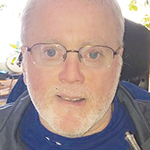By LISA EISENHAUER
 Heaphy
HeaphyDennis Heaphy finds it egregious that, even with evidence linking spiritual wellness to overall well-being, there is very limited support for designating spiritual care as a health
care service.
"We know that spiritual wellness is key to self-perception of one's health outcomes and yet we don't address it in the health care system," says Heaphy, a health justice advocate and researcher at the Disability Policy Consortium, a Massachusetts-based
disability rights advocacy organization.
Heaphy is the co-author with Sasha Shenk of an opinion piece published online Jan. 31 by Health Affairs that urges an expansion of the Centers for Medicare and Medicaid Services' direct reimbursement for spiritual care provided to patients insured in capitated managed care plans for people eligible for Medicare and Medicaid. Shenk is a senior research
technician at the Jonathan Garlick Lab and Center for Integrated Tissue Engineering at Tufts University.
 Shenk
ShenkThe article is part of the Health Affairs Forefront series intended to "inform policies on the state and federal levels to advance integrated care for those dually eligible for Medicare and Medicaid."
In their piece, Heaphy and Shenk maintain that CMS could require providers in Fully Integrated Dual Eligible Special Needs Plans, known as FIDE SNPs, and Programs of All-Inclusive Care for the Elderly "to provide enrollees with spiritual assessments and
spiritual care as optional services."
Even though adding spiritual care to the blanket of services the programs provide wouldn't necessarily increase the amount of public funding they get, the authors say such a step by CMS would confirm the value of spiritual care and, through the related
codes, create valuable data for research purposes.
Personal, professional insight
Heaphy is a person with a disability and is enrolled in the Massachusetts One Care plan. The integrated care program for people ages 21-64 with disabilities will be transitioning into a
FIDE SNP. He is a member of the Medicaid and CHIP Payment and Access Commission. As chairman of the Massachusetts Implementation Council set up to ensure that One Care met enrollees' needs, Heaphy testified last year before the U.S. Senate Special Committee on Aging about the value of integrated care.
While the authors extoll the benefits of spiritual care as a component of primary care, in a recent interview, Heaphy says he first saw the value of spiritual care during a hospital stay. The chaplains who came to his bedside, he says, addressed a need
for understanding and meaning that would have otherwise gone unmet.
"When I sustained a spinal cord injury in 1985, chaplains were vital to my journey toward wholeness," Heaphy says. He later became a chaplain certified through the Association of Professional Chaplains and worked in spiritual care in a number of settings.
Heaphy, who is Catholic, has a master of divinity and a doctorate of ministry in transformational leadership from Boston University and master's degrees in public health and education.
Shenk says her appreciation for the importance of spiritual care stems in part from her work in a research lab focused on scleroderma, a group of rare autoimmune diseases that can cause hardening of skin and connective tissue. Systemic scleroderma can cause problems in the blood vessels, internal organs and digestive tract. Because there is so far
limited treatment for the disease, Shenk says she has seen scleroderma patients struggling to cope and relying on support groups for hope.
"It goes to show that people are creating this in their own way, because it's not offered as a service, to even just connect with other human beings to really talk about what they're going through," she says.
Justice and racial dimensions
In their commentary, Heaphy and Shenk call out access to spiritual care as a health justice issue. They maintain that the care is especially important to people with disabilities, who experience disproportionate levels of isolation and loneliness compared to the general population and make up an estimated one-third of the dual eligible population.
Heaphy says faith traditions have too often linked lack of faith and sin with disability and notes there are examples of this in Judeo-Christian Scripture. He says faith communities can also convey this message in their preaching or in how they engage
with persons with disabilities. Spiritual care from trained chaplains, he says, may provide an opportunity to bring healing to those who have had negative experiences with organized religion or have internalized a feeling of sinfulness.
The authors also assert that spiritual care can be of particular importance to African Americans and other minority populations.
Heaphy, who is white, explains that the literature on spiritual care shows that for many African Americans, their spiritual, religious or faith community can serve as a source of resiliency in the midst of systemic racism. He describes how systemic racism
is evident in the level of health disparities and inequities experienced by African Americans and how integration of spiritual care may be a means of countering inequities.
Heaphy says insurance coverage of spiritual care is a touchy subject for many reasons, starting with the health care system's discomfort with spirituality and all things that cannot be empirically measured. There are also concerns and confusion among
some about spiritual care being government support for religion, he says. Another issue is whether adding another benefit would drive medical costs even higher.
"Health care advocates have an obligation to challenge the current barriers to spiritual care to ensure people have access to person-centered care that values people as mind, body and spirit," Heaphy says. "It is imperative that this need be met among
persons with disabilities who already face systems that deny their personhood."